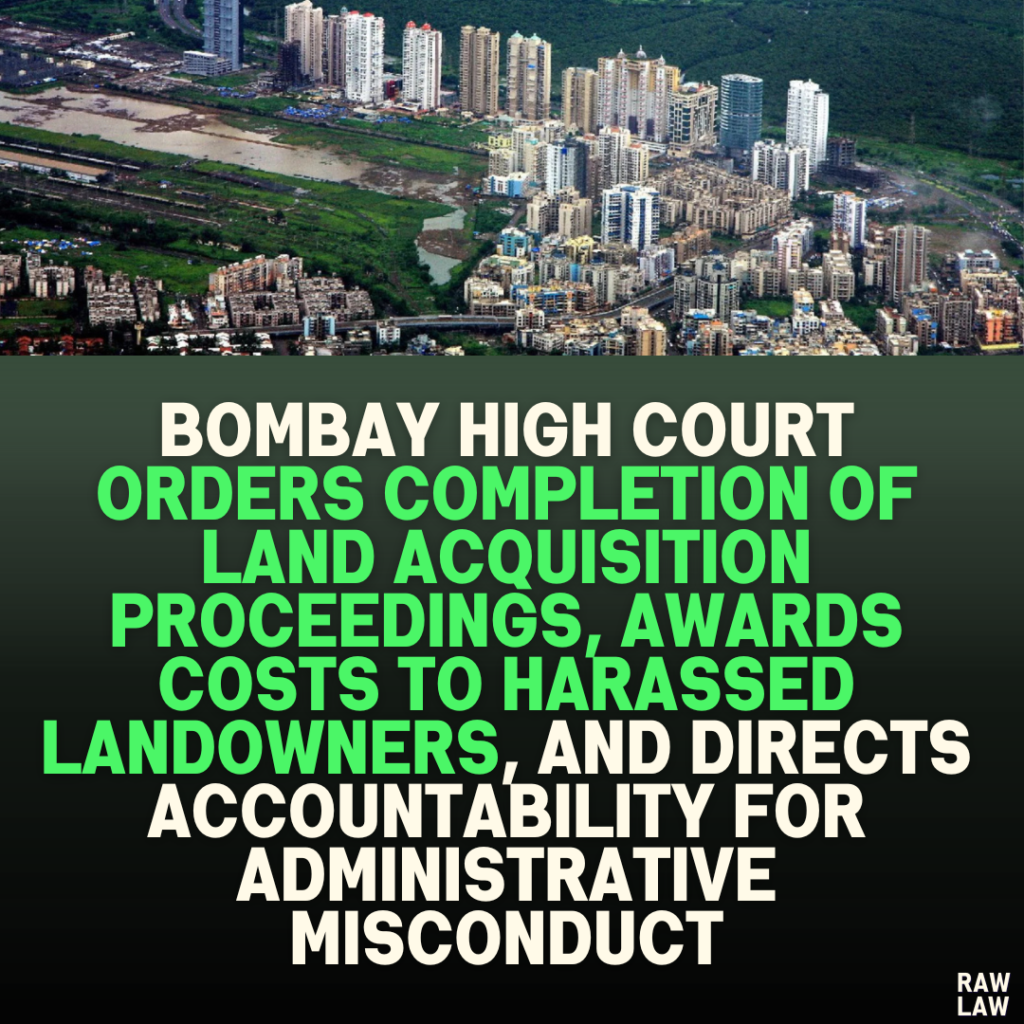Court’s Decision
The Bombay High Court ruled in favor of the petitioners in Writ Petition No. 1983 of 2023, allowing their plea to complete the land acquisition proceedings and directing the authorities to pay the balance compensation with interest. It quashed the demands for the return of advance compensation issued by the State authorities. The Court dismissed Writ Petition No. 7604 of 2018 and Writ Petition No. 10264 of 2023, which sought to challenge the acquisition. The Court imposed costs of ₹5 lakh each on the intervening family member for engaging in vexatious litigation and ordered an inquiry by the Chief Secretary to determine accountability for administrative lapses.
Facts
- The case revolved around land located in Raigad District, Maharashtra, owned jointly by three siblings after inheritance. The property was earmarked for acquisition by CIDCO for the Navi Mumbai project in the 1970s.
- Initial Acquisition Attempts: The acquisition process under the Land Acquisition Act, 1894, lapsed due to inaction but was revived in 2012 under the Right to Fair Compensation and Transparency in Land Acquisition, Rehabilitation, and Resettlement Act, 2013.
- Family Litigation History:
- The land was part of a long-standing family dispute. The Court Receiver was appointed in 1970 as part of a family partition suit. The Receiver was discharged in 2003 under a settlement agreement, but one family member claimed the Receiver still held possession.
- Subsequent family disputes saw multiple claims of oral partitions and demands for shares, further complicating the acquisition.
- Compensation Disputes:
- Advance compensation was paid to the three landowning siblings as per the acquisition policy, but one family member challenged this, asserting that the Court Receiver, not the siblings, should have received the compensation.
- The State, citing procedural irregularities, demanded a refund of the compensation, freezing the bank accounts of the siblings.
- Litigation Expansion: The family member filed several writ petitions alleging improper compensation distribution and sought to quash the acquisition proceedings. This led to delays and additional costs for the landowners.
Issues
- Was the land acquisition process legally valid under the 1894 and 2013 Acts?
- Did the compensation paid to the landowners comply with legal procedures?
- Did the Court Receiver hold rightful possession of the land at the time of acquisition?
- Could the State demand the return of advance compensation already disbursed?
Petitioner’s Arguments
The petitioners (landowners) argued:
- The acquisition process was lawful, and partial compensation had been paid in compliance with the policy.
- The claim that the Court Receiver held possession was baseless, as the Receiver had been discharged in 2003.
- The demands for a refund and freezing of their accounts caused them financial distress and violated their rights.
Respondent’s Arguments
- The State and CIDCO contended that the acquisition had procedural irregularities and that compensation should not have been paid directly to the landowners.
- They claimed the Court Receiver might still hold possession of the property, making the compensation payment invalid.
Analysis of the Law
- The Court analyzed the Land Acquisition Act, 1894, and the 2013 Act, which governs land acquisition, compensation, and procedural compliance.
- It examined prior rulings, particularly the 2003 decision discharging the Court Receiver and the absence of any contemporaneous evidence supporting the Receiver’s possession claim.
- The Court reaffirmed that compensation could be disbursed directly to the rightful landowners under the law unless proven otherwise.
Precedent Analysis
The Court referred to earlier rulings that:
- Confirmed the discharge of the Court Receiver in 2003.
- Established that the Receiver no longer held possession of the disputed land as of 2018, when the State took formal possession.
Court’s Reasoning
- Legitimacy of Acquisition:
- The acquisition was consistent with the provisions of the 2013 Act. Notifications and possession receipts established that the State had lawfully taken possession of the land.
- The claims of irregularities lacked supporting evidence.
- Compensation Issues:
- Advance compensation was paid as an incentive under the policy. The claim that the Court Receiver should have received it was dismissed, as the Receiver had been discharged over a decade earlier.
- Baseless Litigation:
- The family member’s repeated litigation attempts, including claims of oral partitions and objections to possession, were deemed frivolous and intended to obstruct legitimate acquisition proceedings.
- Administrative Misconduct:
- The State and CIDCO displayed contradictory stances, filing conflicting affidavits and failing to provide clarity on acquisition and compensation issues, leading to unnecessary delays and harassment for the landowners.
Conclusion
- For Petitioners: The Court upheld the petitioners’ rights to the land’s compensation, directing the completion of acquisition proceedings within six weeks.
- For Respondent Litigant: Costs of ₹5 lakh each were imposed on the family member for vexatious litigation, which disrupted the legitimate rights of the landowners.
- For State Accountability: An inquiry was ordered to address administrative lapses in the acquisition process, with the Chief Secretary tasked to report on the responsible officials within six months.
Implications
- The decision emphasizes the importance of procedural transparency in land acquisition to protect landowners’ rights.
- It highlights the Court’s intolerance for frivolous and obstructive litigation, particularly in family disputes that complicate public projects.
- The ruling underscores accountability in government actions, urging administrative reforms to prevent delays and ensure equitable compensation.




Pingback: Bombay High Court Dismisses Execution Application by Decree-Holder, Affirms Extinguishment of Claims Not Included in Approved Resolution Plan: “All Claims Stand Extinguished Upon Approval of Resolution Plan Under IBC” - Raw Law
Pingback: Delhi High Court Upholds CESTAT’s Ruling: "Clandestine Manufacture and Clearance Allegations Must Be Backed by Concrete Evidence, Not Assumptions or Retracted Statements" - Raw Law